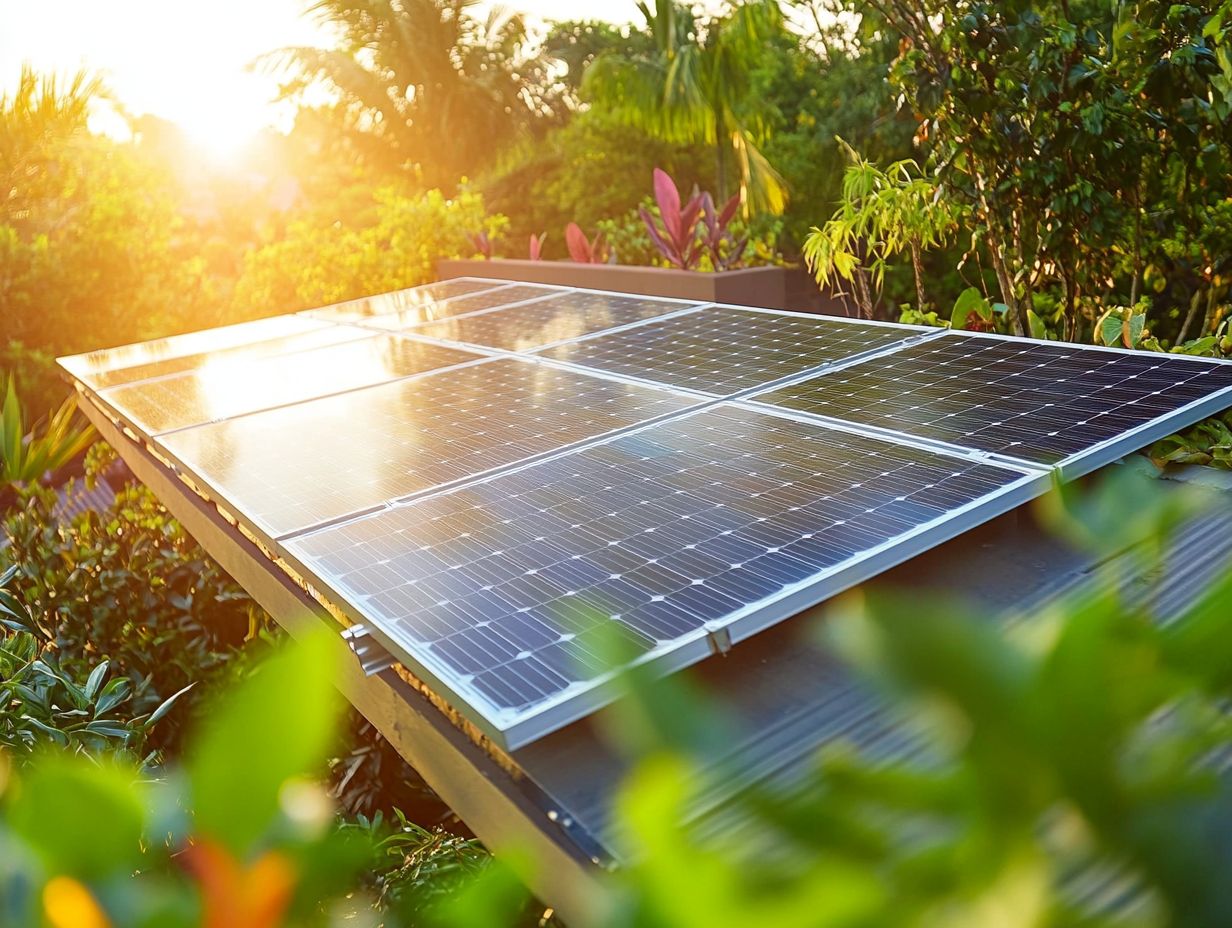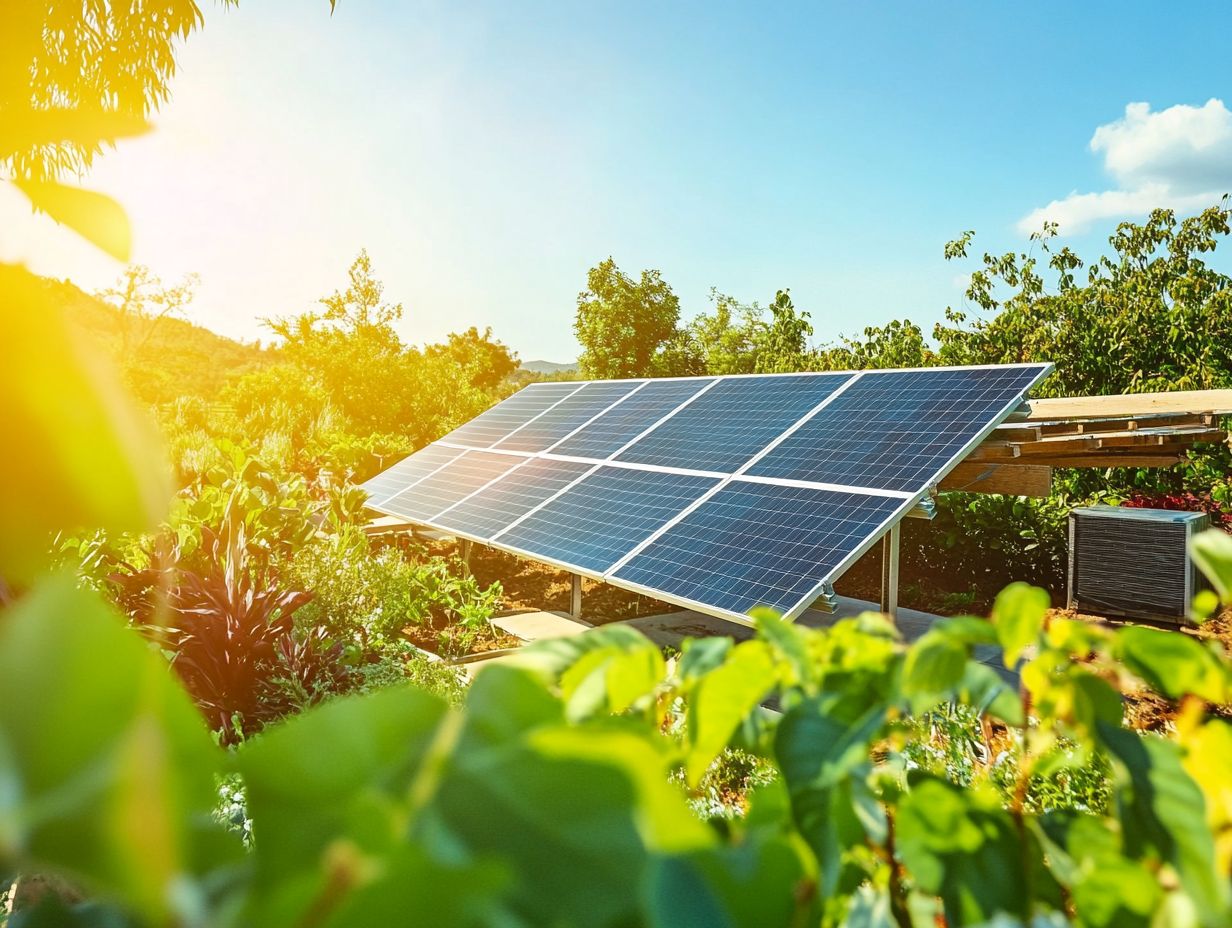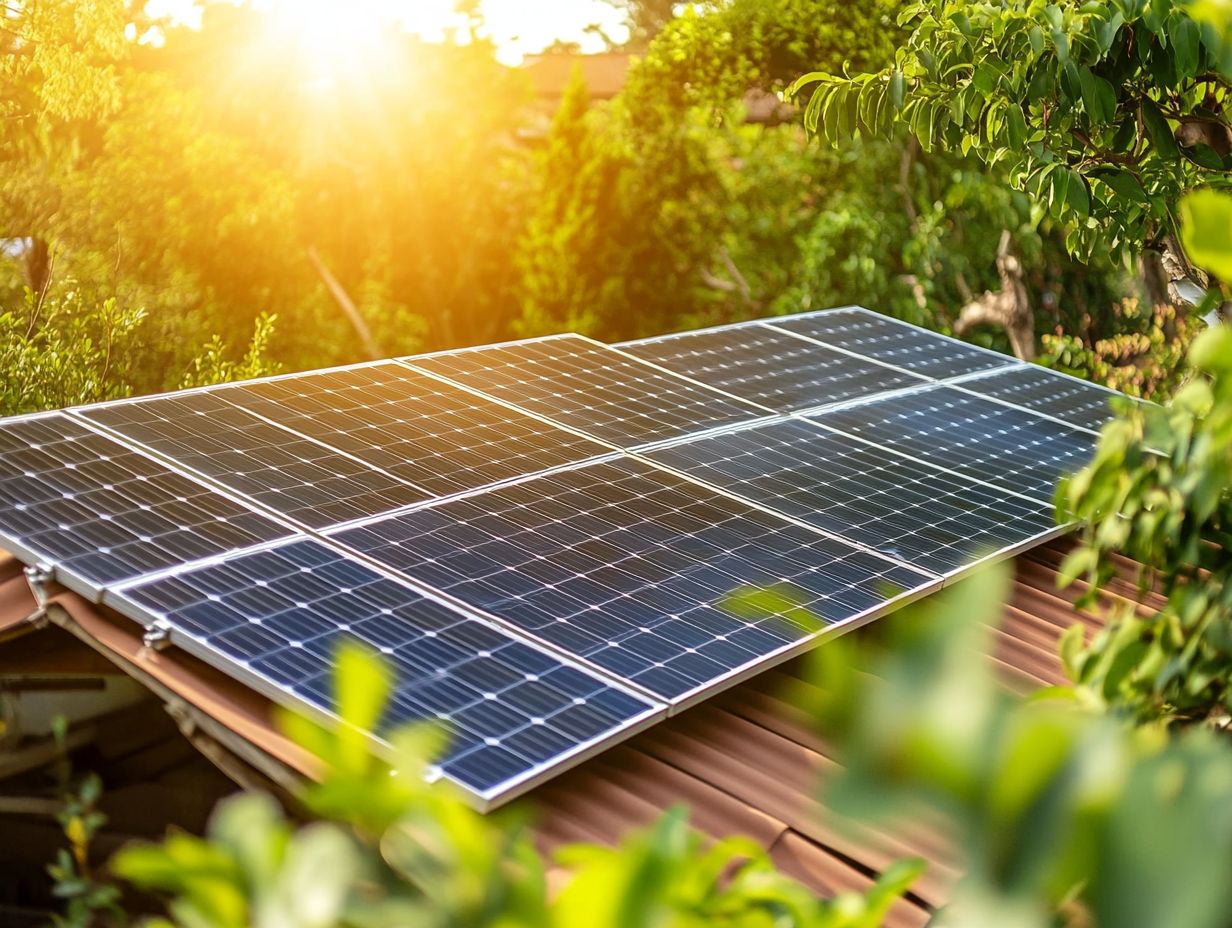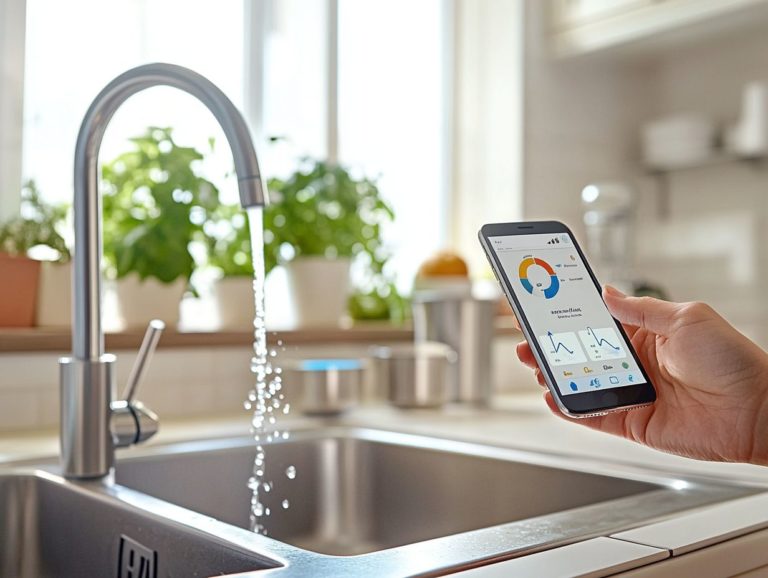How Solar Panels Can Contribute to Water Savings
The connection between solar panels and water might not strike you at first glance, but it s a vital relationship that deserves your attention.
As you explore sustainable solutions to pressing environmental challenges, grasping how solar technology can contribute to water conservation becomes essential.
This article delves into the water footprint of solar panel production. It illuminates the advantages of harnessing solar energy for water savings and offers practical insights for effective implementation.
Prepare to discover compelling real-life examples that demonstrate the powerful synergy between renewable energy and water conservation.
Contents
- Key Takeaways:
- The Relationship Between Solar Panels and Water
- Water Usage in Solar Panel Production
- Benefits of Using Solar Panels for Water Conservation
- Implementing Solar Panels for Water Conservation
- Case Studies on Solar Panels and Water Savings
- Frequently Asked Questions
- How do solar panels help save water?
- What types of solar technologies can contribute to water savings?
- How do solar thermal systems save water?
- Can solar panels be used to purify water?
- How much water can be saved by using solar panels?
- What are the environmental benefits of using solar panels for water savings?
Key Takeaways:

Solar panels can play a crucial role in water conservation by reducing the amount of water used in traditional power generation methods.
Solar panel production has a significant water footprint, but the long-term benefits of using solar panels for water conservation outweigh this initial impact.
Implementing solar panels for water conservation can lead to a decrease in water usage and costs, as well as provide environmental benefits such as reducing carbon emissions.
The Relationship Between Solar Panels and Water
The relationship between solar panels and water is fascinating. Both play crucial roles in water management and sustainable energy production.
By harnessing solar energy, you can significantly reduce reliance on fossil fuels. This minimizes the environmental impacts linked to traditional energy sources while promoting clean electricity.
Adopting solar panels greatly enhances water conservation efforts. This manages consumption and improves overall water efficiency across various sectors, including agriculture and residential use.
This dynamic interaction between solar power and water highlights the necessity for innovative solutions to tackle climate change and foster a more sustainable future.
How Solar Panels Can Help Conserve Water
Solar panels can play a pivotal role in water conservation by offering renewable energy solutions that significantly reduce overall water usage across various applications.
By harnessing sunlight to generate electricity, these systems eliminate the reliance on traditional methods of energy production. These often use large amounts of water for cooling and processing.
Moreover, innovative installations like floating solar panels take advantage of bodies of water. This enhances energy efficiency while simultaneously minimizing evaporation rates from the water s surface.
When integrated into agricultural practices, solar power enables farmers to efficiently power irrigation systems. This helps conserve precious water resources.
This illustrates how solar energy can be a vital component in promoting sustainable farming and effective water management strategies.
Water Usage in Solar Panel Production
The water usage in solar panel production is a crucial factor in the renewable energy sector that frequently slips under the radar. However, it carries significant implications for overall sustainability and water efficiency that you shouldn’t overlook.
Understanding the Water Footprint of Solar Panels
Understanding the water footprint of solar panels is crucial for grasping their overall environmental impact. It also highlights the potential benefits they offer in clean electricity generation.
While solar power is rightly celebrated for its low greenhouse gas emissions, it’s important to recognize that it requires water throughout various stages, such as manufacturing and panel cleaning.
Research shows that the water consumption of solar installations is significantly lower compared to traditional electricity sources like coal and natural gas. These use large amounts of water during mining, extraction, and cooling processes.
For instance, studies indicate that coal power plants can consume up to 25,000 gallons of water per megawatt-hour produced. Solar panels may use only a fraction of that over their entire lifecycle. This stark comparison highlights the necessity of assessing the broader environmental implications tied to different energy sources and makes a compelling case for transitioning toward more sustainable options.
Benefits of Using Solar Panels for Water Conservation
Using solar panels for water conservation provides exciting benefits! You can boost renewable energy production and dramatically cut down on water use.
Embracing this innovative approach not only contributes to sustainability but also enhances your resource efficiency in remarkable ways.
Consider exploring solar energy options or getting involved in conservation efforts today!
Reducing Water Usage and Costs

Implementing solar panels can lead to significant reductions in water usage and costs, making them an exceptionally cost-effective solution for both residential and commercial applications.
By harnessing solar energy for various processes, such as irrigation and heating, you can dramatically decrease your overall water consumption. For example, agricultural operations that adopt solar-powered irrigation systems often report water savings of up to 50%. This leads to substantial reductions in their water bills.
As a residential user, you could experience considerable benefits. Many have cut their electricity costs by more than 30%, allowing them to reallocate funds typically spent on energy toward other necessities. Consider the case of a California farm that integrated solar panels into its irrigation system, achieving annual savings exceeding $20,000.
These achievements show how much your wallet can benefit! They also highlight the crucial role of solar technology in promoting sustainable water management practices across various sectors.
Environmental Benefits
The environmental benefits of using solar panels go far beyond mere energy generation. They play a crucial role in climate change mitigation by reducing reliance on fossil fuels.
Numerous studies underscore that embracing solar energy on a larger scale can significantly cut greenhouse gas emissions, a primary driver of global warming. A compelling study from the National Renewable Energy Laboratory reveals that transitioning to solar energy could potentially reduce carbon dioxide emissions by billions of tons each year.
By promoting clean electricity generation, solar panels not only help preserve air quality but also protect ecosystems threatened by traditional energy sources. By integrating solar technology into your community s energy landscape, you can contribute to a more sustainable future and help mitigate the negative impacts of climate change.
Implementing Solar Panels for Water Conservation
Implementing solar panels for water conservation requires attention to several crucial factors. You’ll need to choose the appropriate technology, familiarize yourself with local regulations, and assess your energy production needs.
Each of these steps is vital to ensuring a successful and sustainable installation.
Factors to Consider
When considering the installation of solar panels, you should evaluate several key factors, including site assessment, regulatory conditions, and how doable the project is.
It s essential to examine local water management practices closely. This ensures that your system integrates seamlessly with existing resources while minimizing any potential ecological impacts.
Understanding regulatory conditions, such as zoning laws, is equally important. These regulations dictate where you can place solar installations and may require permits or adherence to specific guidelines.
The selection of technology is another critical aspect. Different types of solar panels, like photovoltaic panels which convert sunlight into electricity, come with varying efficiencies and costs. Ensure that your choice aligns with your energy needs and project budget.
Ultimately, thorough consideration of these interconnected factors will set the stage for a successful and sustainable solar energy initiative.
Steps to Take
The journey to implementing solar panels for water conservation begins with thoughtful planning, careful selection of technology, and effective coordination with local water utilities.
Start by conducting a comprehensive assessment of your site; consider key factors like sunlight exposure, roof structure, and available space.
It s vital to evaluate various solar technologies whether you’re leaning toward photovoltaic panels or solar thermal systems to determine which best aligns with your specific conservation goals.
Engaging with water districts and regulatory bodies is crucial. They can offer valuable guidance on incentives, permits, and compliance requirements. This collaboration not only ensures you adhere to legal standards but also facilitates the seamless integration of solar energy into your existing water conservation initiatives, ultimately nurturing a more sustainable community.
Now is the time to embrace solar energy to save money and protect our planet!
Case Studies on Solar Panels and Water Savings
Case studies on solar panels and water savings present compelling evidence of their effectiveness in enhancing water efficiency and fostering sustainable energy practices across various sectors.
You can see firsthand how these technologies not only conserve water but also contribute significantly to a greener future.
Real-Life Examples of Successful Implementation

Real-life examples of successful solar panel implementations reveal how organizations and communities have achieved impressive water savings while enhancing efficiency in their operations.
A community in California saw a remarkable reduction in water usage after integrating solar energy into their irrigation systems. This clever move allowed them to power water pumps with minimal reliance on traditional energy sources.
Similarly, consider a nonprofit organization in Arizona that made the strategic decision to install solar panels on their buildings. As a result, they experienced a significant drop in utility costs, allowing them to redirect those freed-up resources toward additional conservation projects.
Their experience exemplifies the powerful synergy between renewable energy usage and water preservation efforts.
Frequently Asked Questions
How do solar panels help save water?
Solar panels help save water by reducing the need for traditional energy sources, which require large amounts of water for cooling and production.
What types of solar technologies can contribute to water savings?
Solar thermal systems and photovoltaic (PV) systems both have the potential to contribute to water savings by reducing the need for energy from traditional sources.
How do solar thermal systems save water?
Solar thermal systems use sunlight to heat water, reducing the need for electricity or gas-powered water heaters. This saves water by reducing the energy needed to heat water.
Can solar panels be used to purify water?
While solar panels themselves do not purify water, solar-powered water purification systems are becoming increasingly popular in areas with limited access to clean water sources.
How much water can be saved by using solar panels?
The amount of water saved by using solar panels varies depending on the specific technology and location. However, estimates show that using solar panels can save hundreds of gallons of water per year for the average household.
What are the environmental benefits of using solar panels for water savings?
Aside from saving water, using solar panels also reduces greenhouse gas emissions and helps combat climate change. This is because solar panels generate energy without burning fossil fuels, which releases harmful pollutants into the environment.
Explore your solar options today and join the movement towards a sustainable future!






